|
Every so often an interaction with a student provides invaluable perspective and outlook on both teaching and life. Today was one of those instances.
I was in charge of today’s PBIS (Positive Behavior Interventions and Support) Assembly, where we recognize students who have shown the RAMS Way (Respect, Always Responsible, Manners, and Safety) over the past month. Students receive awards, VIP tickets, play games, and are reminded to show the RAMS Way everyday, both in and out of school. Since it is almost Halloween, I chose to do a Halloween themed “Eyeball relay race” which involved students using a spoon to carry a bouncy ball eyeball (I found them at Target!) around a series of cones. For the younger grades they just walked/ran around the cones, and the older grades we had them use scooters. It was prior to the older grades’ assembly that the perspective I mentioned earlier was experienced. You see, while drawing names for students to participate in the game, I drew the name of a student who happened to be on crutches. For a second I thought I should draw another name to replace the student, however at just that moment the student in question walked by. I asked them to stop by the table where I was drawing names, and let them know I had drawn their name for the game, explained what the game entailed, and asked if there was a classmate they would like to pick to go in their place. Expecting to hear the name of one of their friends, I was surprised when the student said “No, I am going to do the relay.” A little perplexed, I asked if they were sure, and the student quickly replied, “Mrs. Laird, I still have one good leg!” and walked away. Believe me when I say I felt about an inch tall! In that one statement, “I still have one good leg,” I learned so much and was reminded how harmful it can be to have a deficit mindset. I need to remember to focus on what I do have, what I can control, and always have a positive outlook. This memory will stick with me for the rest of my teaching career and life, and perhaps I’ll find a way to turn it into a children’s story or weave it into a professional book!
0 Comments
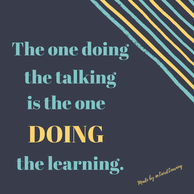 Last week I participated in a webinar by Lori Oczkus that focused on Developing Language for Deeper Reading Comprehension. I as sat listening to the research about the power of talk in classrooms and in literacy comprehension I began to reflect on the role of talk in my position as an Instructional Coach and aspiring administrator. Just like students in a classroom need to talk, teachers engaging in coaching conversations need to talk too. A coach or administrator's role in the conversation is to listen to understand and ask questions that will promote reflection. As I continue to work with teachers, I will remember: The one doing the talking is the one doing the learning." This year, our building is reading Teach Like a Champion 2.0 by Doug Lemov. As I was reading about planning for error, a statement stood out to me: "Don't bury the data."
This resonated with me because I had just attended a building professional development session where teachers were analyzing and reflecting on their reading fluency data from the past few years. Some teachers brought up great points about looking at growth, and not being so focused on achieving a certain percentage; but personally, no matter how you approach data, when students aren't demonstrating understanding of a concept, action steps and innovation need to occur. It can be easy to look at formative or summative data and come up with explanations as to why the data is what it is, but that doesn't sit well with me. Simply putting a stake in the ground and saying "this is just how our data always looks," goes against two questions a PLC responds to (Dufour's PLC Four Essential Questions):
I see data as a puzzle piece which helps tell a student's story and allows a teacher to make changes, innovate their teaching practices, and collaborate with their PLC, in order to create learning opportunities and structures suited for each student. By no means am I saying data the sole piece, but with it, teachers can work toward the common goal of student learning. Instead of burying data, let's respond to it and act on it! This year, we are using Google Classroom to house all our PLC and Professional Development resources. All posts are tagged with topics like "Building PD," "PLC - Student Focus," and "PLC - Professional Growth." I love how easy Classroom is to use, and having everything in one place allows all staff members to easily locate resources. After posting on social media about how we're using Classroom this year, I was asked to share directions on how I set up our building's Google Classroom. Rather than sending multiple emails, I decided to type up some directions. Setting up a PLC in Google Classroom
If you have any questions, or would like help setting up your building's Teaching & Learning Google Classroom, let me know!
This year, my building has is implementing PLCs in all grade levels. The first activity we led the PLCs through was drafting norms. To aid in this process, the following video was shown:
After watching the video, each PLC team member was given a notecard and asked to reflect on the three tasks posed in the video:
1. Brainstorm a list of norms, then share out and identify which ones you have in common. 2. Write down the commitments you need from each member 3. Identify 1-2 behaviors that have bothered you in past meetings Together, the group then wrote the agreed upon norms in "We will..." or "We commit to..." statements. These norms will be posted on each PLC agenda, and revisited throughout the year. As a future administrator, it has been beneficial to observe PLCs being implemented, and I know I will learn a great deal this year! I was recently interviewed for a Literacy Today article focused on building a culture of literacy. The article can be found in the July/August 2017 edition of Literacy Today. Below you will find my responses to the interview questions: In your mind, what does it mean to have a culture of literacy in a school? A culture of literacy is when students, teachers, administrators, and support staff have a shared vision of what literacy is and why it is important. In addition, teachers and administrators rely on research-based instructional practices and data to make decisions and support students in their literacy journey. Finally, literacy is not something that occurs during a specific time of day or content area, but rather is infused throughout a student’s daily learning experience. What is the coach's role in this process and are there strategies that can help to get teachers on board in creating that culture? Coaches are there to support, model, and facilitate literacy instruction and data informed decisions. Although a coach is a literacy leader, it is important that the coach isn’t the only literacy leader, and that they are not viewed as the expert. If the coach is to be effective and the culture of literacy to be the norm, the coach must build the capacity of the teachers they support. What practices have worked in your school? And what hasn't worked? What has worked: Cultivating a shared vision, developing shared leadership, meeting teachers where they’re at in their understanding of literacy instruction, professional needs, etc., having a building or site-based coach, high functioning PLCs, using data to problem solve and inform instruction What doesn’t work: Drive PD with no follow through or application time, forgetting to share the “why” behind a PD or research-based instructional practice What is the role of a principal or district-level official in encouraging this approach in schools? Is it something that is more likely to develop if it isn't mandated, or district-led? A principal or district-level official is there to support the establishment of the literacy culture. They are co-learners in this process, and because the culture of literacy is important, they will make sure that time (instructional and professional development wise), funds, and resources are allocated. I think it could be developed if it isn’t mandated, but if it is done in such a way that it’s the way we do business, all stakeholders will recognize the need and rather than it being viewed as an initiative being done to the teachers, it will be seen as a collective effort to better the lives of our students. What a culture of literacy looks like: Throughout the day, you would see students reading, writing, speaking, listening, and creating. Teachers, no matter the content area, are engaging students in literacy. When you enter a classroom, there's a buzz! Students are co-constructing knowledge by using available resources (books, websites, videos, experts, etc.), they are immersed in a print-rich environment, the classroom library has high interest and developmentally appropriate books, and the teacher is meeting with students individually, in small groups, and as a whole class. Our students have access to books throughout the building, whether it's in their book boxes, the classroom or school library, or the bins of books located in the halls, office and common areas. Students are publishing writing to authentic audiences (outside the classroom or school walls) Teachers, principal, and all support staff model being readers and writers. I made "What is _____ (insert staff member's name) Reading. What are you reading?" posters for everyone to post outside their classroom doors. This allowed students to see the adults in their lives as readers too. Also, when students are writing/reading, the teachers are doing the same. As a coach, what strategies have you used to build a culture of literacy: This year I added P.O.P. teams (Peer Observation Partnerships) to our building. They're partnerships between two teachers where they informally observe one another throughout the year, noting evidence of our district's literacy framework and literacy strategies we've introduced in PD, and they reflect on what's working and discuss areas for growth. Last year, after reading Read, Write, Lead, I had our staff write down their top 3 literacy beliefs and then we came to a collective agreement about what our building's top 3 beliefs were. Recognizing your beliefs shape your actions, we were able to further cement our culture of literacy by identifying action steps we will take to ensure our beliefs come true for our students. These actions included: read alouds at least once every day, daily providing students time to read a book of their choice, publishing writing to an authentic audience, using mentor texts and holding reading and writing conferences with each student, incorporating writing to learn and accountable talk in all subject areas, and that every teacher is a literacy teacher. I serve one elementary building, so I am easily accessible to every teacher in the building to facilitate coaching cycles, model, co-teach, co-plan, and analyze data. I also strive to be visible throughout the day, and visit classrooms on a daily basis. During these informal visits, I am able to take note of areas of implementation, and what needs to be focused on either in a one-on-one conversation, grade level PLC meeting, or whole staff PD. I wrote a grant to send home monthly literacy bags that contain a new book and a reading activity parents can use with their child at home. These books are kept by the families with the goal of building up their home libraries. I also added a Little Free Library in front of our building, and love seeing children and their parents borrowing books. I'd love to hear, what have you done in your building or district to nurture a culture of literacy? I have been looking for ways to increase collaboration and provide teachers with authentic opportunities to lead and learn from one another. This year I introduced POP Teams (Peer Observation Partnerships), and for the first half of the year they seemed to work well. One of the biggest drawbacks of POPs was teachers wanted to collaborate with more than just their chosen parter. I also noticed the level of peer coaching wasn't where I would have liked it to be, and the number of instances where teachers went in to visit another classroom was small. One day, as I was looking on Twitter, I came across Mark Barnes' Pineapple Chart blog post. I began reading up on this, and approached you principal about possibly implementing this next year. 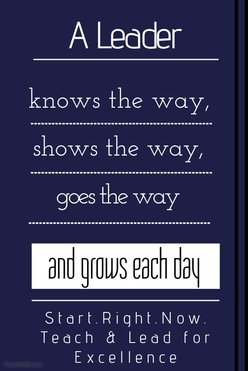 Currently, I'm reading Start. Right. Now.: Teach and Lead for Excellence by Whitaker, Zoul, and Casas, and the book and quote pictured allowed me to reflect on what I am doing on a daily basis. The start of this quote is nothing new, John C. Maxwell's words have been shared in professional literature, on motivational posters, and during conference sessions, but the authors of Start. Right. Now., added "and grows each day" to the end. By adding those four words, I felt the authors wanted to demonstrate the importance of a principal/teacher/coach viewing themselves as a lead learner. Taking time to reflect on my own work, I looked at each phrase and identified where my work fit. Knows the Way: Based on state and district initiatives, building improvement goals, student and teacher needs, and my own informal observations, I am able to identify where we are and where we need to head. Throughout the year, I set aside time to check in on the steps we as a building and myself as a coach, have taken toward meeting the goals. Based on the data and feedback, I will make changes to the course I/we are on. I am also willing to admit when I don't know something, and will reach out to my colleagues and PLN for advice or assistance. Shows the Way: So much of what I do as an Instructional Coach revolves around modeling, or showing the way. On a daily basis, I am in classrooms partnering with teachers to plan, teach, reflect, or implement an instructional practice. Along with modeling in classrooms, my actions throughout the building and district demonstrate the impact I believe our work is having. In coaching, as in other leadership areas, transparency is vital, so along with showing the way, I have to show the "why." Goes the Way: Like most adult learners, when a new district initiative, state program, or change comes around, I like to know the why behind it. This allows me to learn more about the change and grapple with how it will impact the students and teachers I serve, and most importantly how I will continue to be an advocate and ambassador for these stakeholders. Grows Each Day: Through professional readings, social media, grad classes, conferences, EdCamps, workshops, MOOCs, and my PLN I have had the opportunity to continue learning, reflecting, and growing every day. By no means am I an expert, but through the aforementioned activities, I strive to increase my knowledge, home my skills, and make a difference every day. I love to read, and I have to say, Start.Right.Now is a book I will absolutely recommend to colleagues, classmates, and anyone looking to challenge themselves as a teacher and leader! This week I attended the first day of a two day workshop on Facilitating Adult Learning. While I have presented and facilitated numerous professional learning opportunities in my building and district, as well as at local, state, regional, and soon national conferences, I am always looking for additional strategies and ideas to add to my toolbox. Now that I am serving as an Instructional Coach, and am assisting in the professional learning of teachers in my building, I knew that there was no time like the present to attend this workshop and grow as a learner, coach, presenter, and facilitator.
During the workshop, the instructors and participants discussed what professional learning was, and most people there mentioned "sit and get" conferences and workshops. I, on the other hand, thought outside the typical Professional Development settings and referenced social media and the impact my virtual PLN has played in my growth as a professional. As I sat in the workshop, I began thinking about the Personalized PD I implemented earlier this school year. As you can imagine, because Personalized PD involves choice, it quickly became a huge hit! While it has been successful, there's always room to improve. Lately I've been thinking how I could use our 1:1 devices to extend and enhance teacher learning. Through Twitter chats like #Educoach, my PLN on Voxer, and reading several blogs by professional development leaders and fellow Instructional Coaches, I began to explore how online resources like iTunes U, Teaching Channel, Atomic Learning, and even eBooks published with iBooks Author or Book Creator, can serve as professional learning platforms. I'm still working out how this would function, but am intrigued by the potential these tools hold! |
Archives
October 2023
Categories
All
|
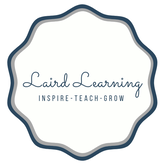

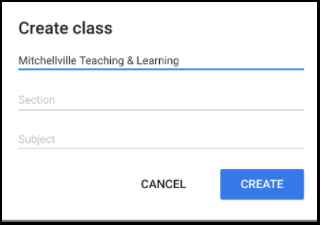
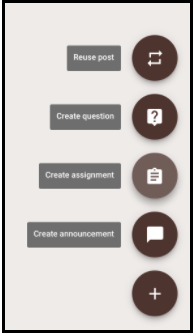

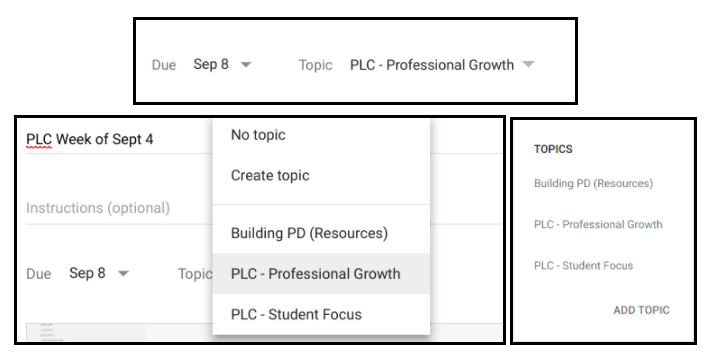

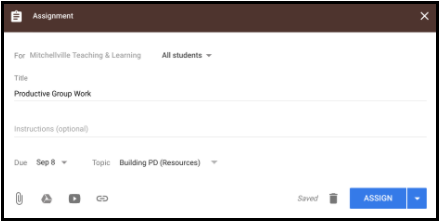
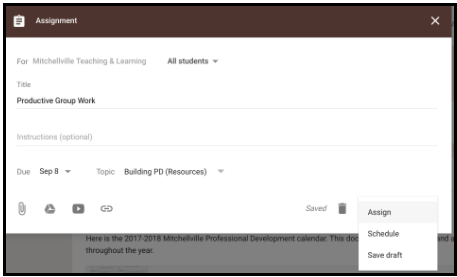
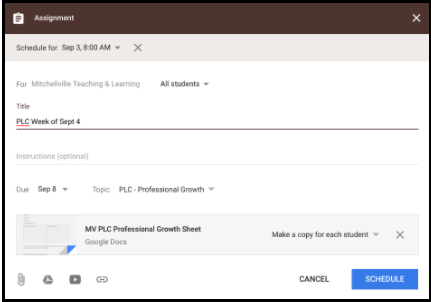


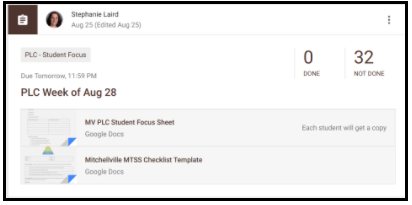
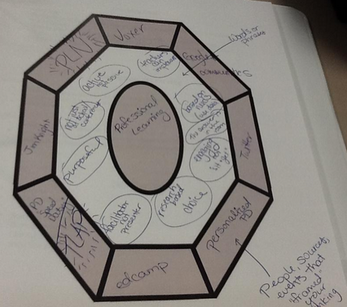
 RSS Feed
RSS Feed
